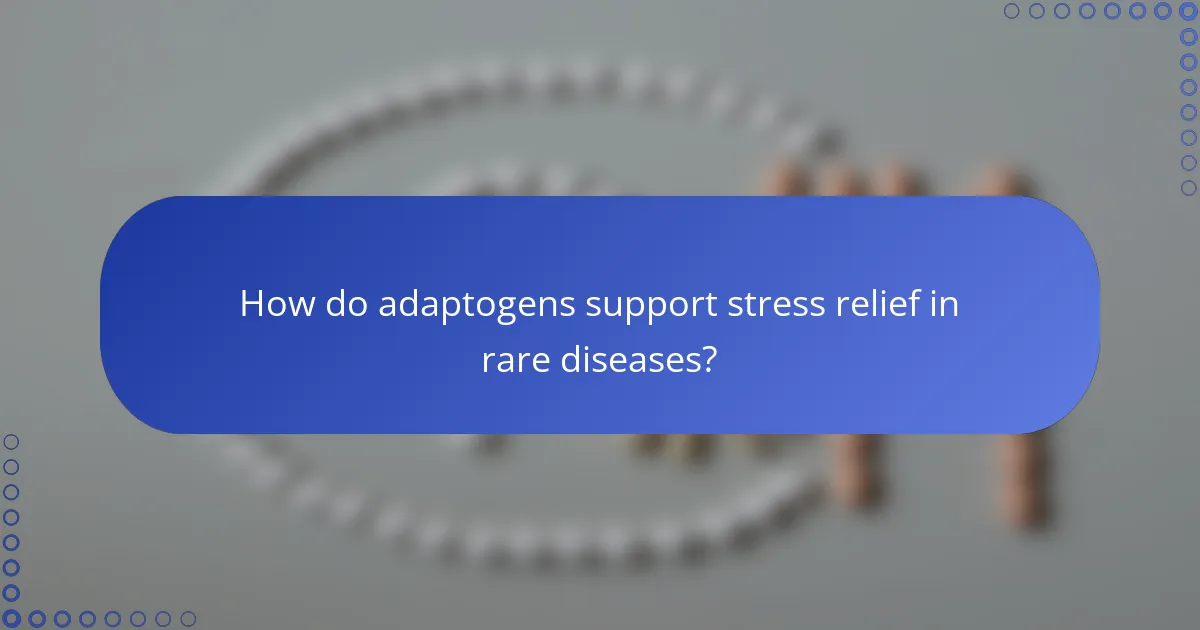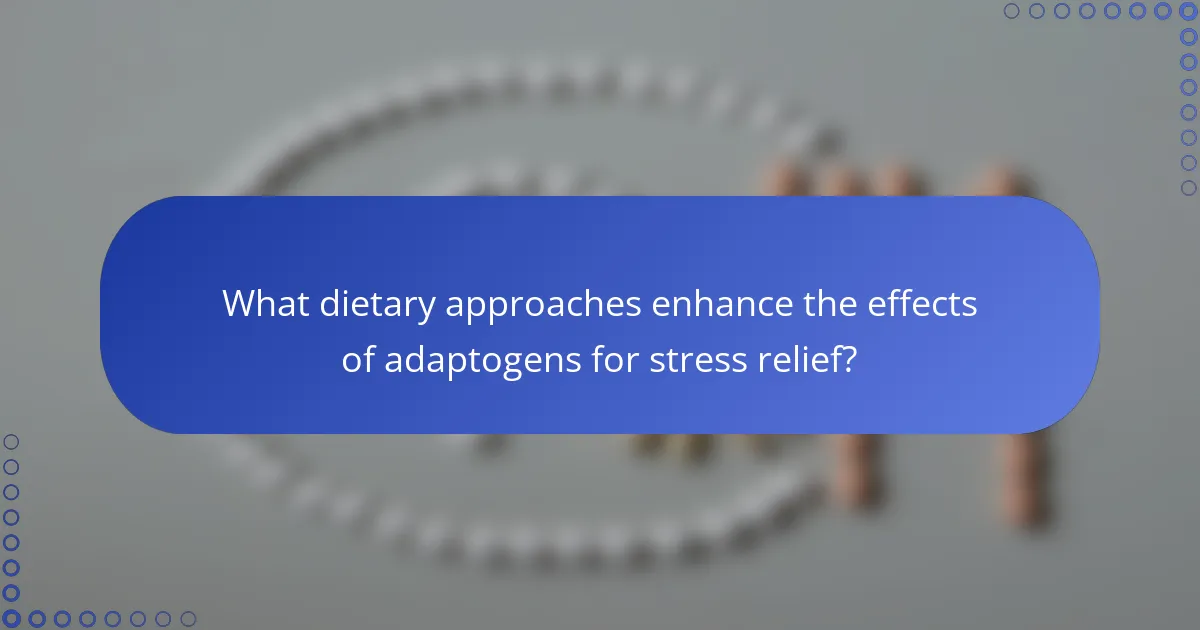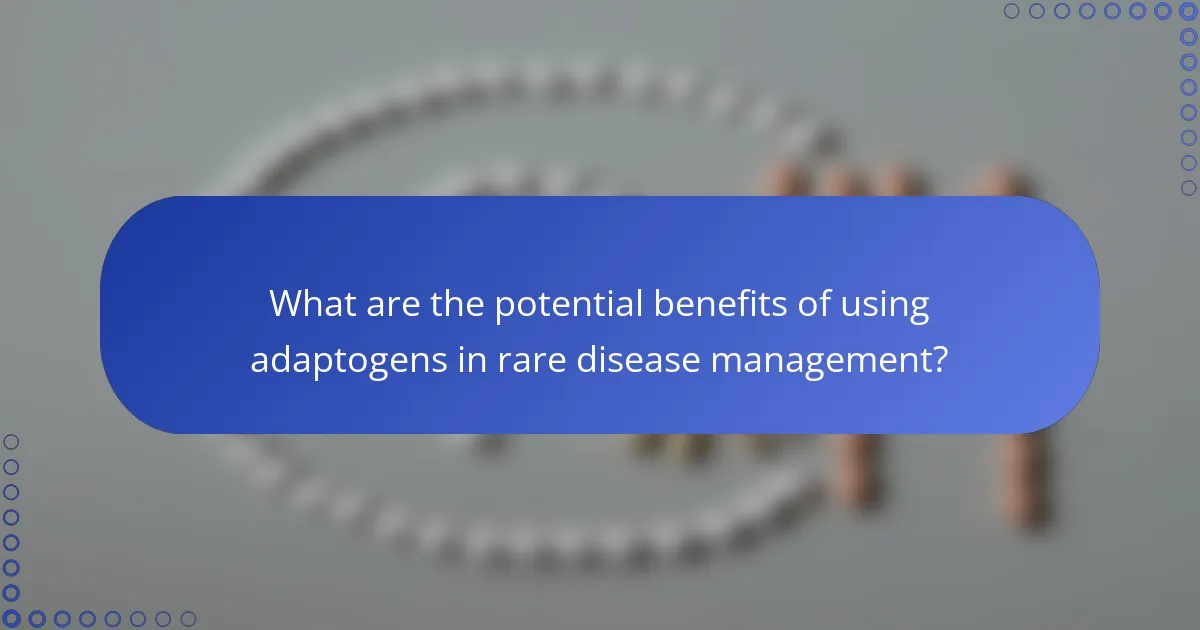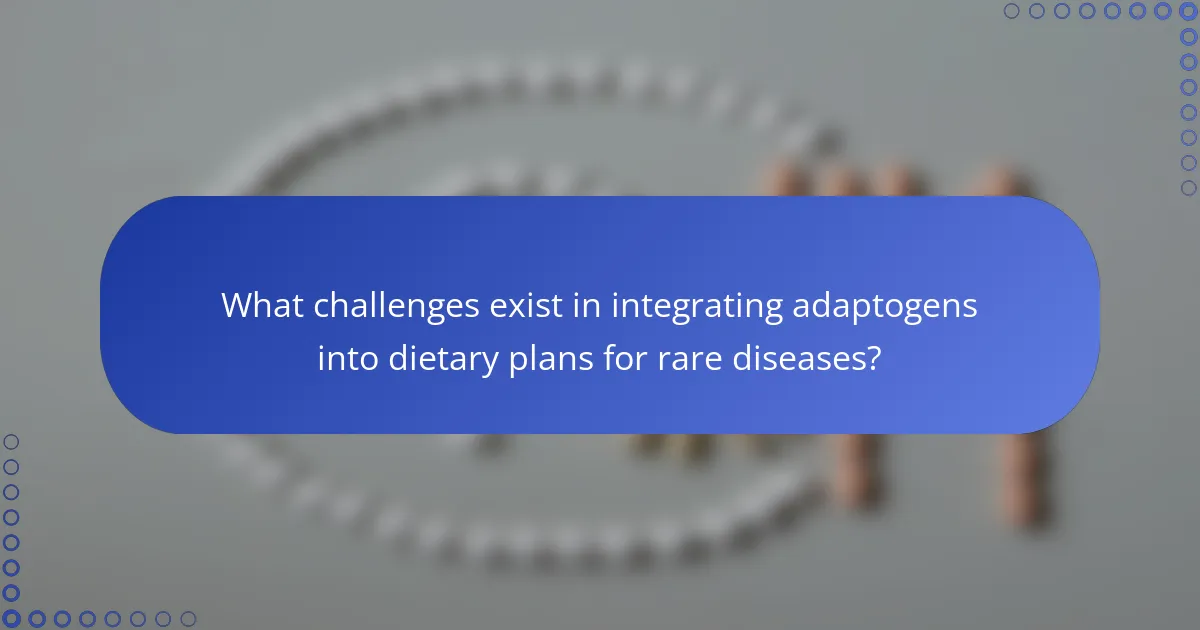Adaptogens can play a crucial role in managing stress for individuals with rare diseases. These natural substances help balance cortisol levels and enhance resilience to stress. The article explores dietary approaches that amplify the benefits of adaptogens, highlights specific adaptogens effective for stress relief, and addresses challenges in their integration into dietary plans. Practical tips for safe incorporation into daily routines will also be discussed.

How do adaptogens support stress relief in rare diseases?
Adaptogens can effectively support stress relief in individuals with rare diseases by modulating the body’s stress response. These natural substances help balance cortisol levels, enhancing resilience to stress. For instance, adaptogens like ashwagandha and rhodiola have shown benefits in reducing anxiety and improving mood, which can be particularly valuable for those managing chronic health conditions. Incorporating adaptogens into dietary approaches may offer a holistic strategy for stress management, promoting overall well-being in rare disease contexts.
What mechanisms do adaptogens use to influence stress responses?
Adaptogens influence stress responses through various mechanisms, primarily by modulating the hypothalamic-pituitary-adrenal (HPA) axis. These compounds help regulate cortisol levels, promoting homeostasis. Additionally, adaptogens enhance resilience to stress by improving neurotransmitter balance and reducing inflammation. Their unique ability to support cellular energy production contributes to overall stress management.
Which adaptogens are most effective for stress management in individuals with rare diseases?
Adaptogens such as ashwagandha, rhodiola, and holy basil are effective for stress management in individuals with rare diseases. These adaptogens can enhance resilience to stress while supporting overall health.
Ashwagandha is known for its ability to reduce cortisol levels, which can be particularly beneficial for individuals facing chronic stress. Rhodiola offers unique properties that improve mental performance and reduce fatigue. Holy basil is recognized for its anti-inflammatory and antioxidant effects, contributing to stress relief.
Incorporating these adaptogens into dietary approaches may provide significant benefits for stress management in rare disease contexts. Always consult healthcare professionals before starting any new supplement regimen.

What dietary approaches enhance the effects of adaptogens for stress relief?
Incorporating specific dietary approaches can significantly enhance the effects of adaptogens for stress relief. Focus on whole foods rich in vitamins and minerals, such as leafy greens and nuts, which support overall health.
Including omega-3 fatty acids from fish or flaxseeds can improve brain function and mood stability. Foods high in antioxidants, like berries, combat oxidative stress, further amplifying adaptogen benefits.
Fermented foods, such as yogurt and kimchi, promote gut health, which is linked to emotional well-being. Staying hydrated with water or herbal teas also supports the body’s stress response.
Combining these dietary strategies with adaptogens like ashwagandha or rhodiola can create a synergistic effect, enhancing stress relief outcomes.
How can specific dietary patterns complement adaptogen intake?
Specific dietary patterns can enhance the effectiveness of adaptogens in managing stress related to rare diseases. Integrating whole foods rich in nutrients can complement adaptogen intake by providing essential vitamins and minerals that support overall health. For example, a diet high in antioxidants can reduce oxidative stress, potentially amplifying the adaptogenic effects.
Incorporating anti-inflammatory foods, such as fatty fish and leafy greens, may further optimize the body’s response to stress. This synergistic approach can lead to improved emotional resilience and better management of stress symptoms. Tailoring dietary patterns to individual needs maximizes the benefits of adaptogens, creating a holistic strategy for stress relief.
Which foods should be avoided to maximize adaptogen effectiveness?
To maximize adaptogen effectiveness, avoid processed foods, refined sugars, and excessive caffeine. These items can hinder the benefits of adaptogens. Whole foods, such as fruits, vegetables, and whole grains, support their stress-relieving properties.

What are the potential benefits of using adaptogens in rare disease management?
Adaptogens may help manage stress and improve overall well-being in individuals with rare diseases. These natural substances can enhance resilience to stressors, potentially leading to better disease outcomes. For example, adaptogens like ashwagandha and rhodiola have shown promise in reducing fatigue and anxiety, which are common in rare disease patients. Incorporating adaptogens into dietary approaches may support mental health and improve quality of life. Their unique ability to normalize physiological functions can be particularly beneficial for managing the complex symptoms associated with rare diseases.
How do adaptogens impact overall health and wellness in rare disease patients?
Adaptogens can enhance overall health and wellness in rare disease patients by promoting stress relief and improving resilience. These natural substances, such as ashwagandha and rhodiola, support the body’s ability to adapt to stressors. Research indicates that adaptogens may help reduce anxiety and fatigue, which are common challenges for rare disease patients. By improving energy levels and mental clarity, adaptogens can contribute positively to the quality of life in this population.
What role do adaptogens play in enhancing mental clarity and mood stability?
Adaptogens enhance mental clarity and mood stability by regulating stress responses and promoting balance. These natural substances, such as ashwagandha and rhodiola, help reduce cortisol levels, which can lead to improved cognitive function and emotional resilience. Their unique ability to adapt to the body’s needs makes them valuable in dietary approaches for stress relief, especially in individuals with rare diseases. Incorporating adaptogens into a balanced diet may support overall mental health and stability.

Which adaptogens are uniquely suited for specific rare diseases?
Certain adaptogens are particularly effective for managing stress in individuals with rare diseases. For instance, Rhodiola rosea can enhance mental clarity and reduce fatigue, making it beneficial for conditions like chronic fatigue syndrome. Ashwagandha is known for its stress-reducing properties and may support immune function, which is valuable in autoimmune diseases. Schisandra chinensis has adaptogenic effects that can help with liver function and stress resilience, making it suitable for hepatic disorders. Lastly, Holy Basil may help regulate cortisol levels, offering support for those with stress-related symptoms in rare conditions.
What evidence supports the use of ashwagandha for stress relief in rare autoimmune conditions?
Research indicates that ashwagandha may aid stress relief in rare autoimmune conditions through its adaptogenic properties. Clinical studies show that ashwagandha can lower cortisol levels, which is vital for managing stress. Additionally, it enhances overall well-being and resilience, particularly in individuals facing chronic health challenges. The unique ability of ashwagandha to modulate the immune response offers potential benefits for those with autoimmune disorders. For example, a study demonstrated a significant reduction in stress and anxiety levels among participants taking ashwagandha compared to a placebo group.
How does rhodiola rosea benefit individuals with rare metabolic disorders?
Rhodiola rosea offers potential benefits for individuals with rare metabolic disorders by enhancing stress resilience and metabolic regulation. This adaptogen may improve energy levels, reduce fatigue, and support overall metabolic function. Its unique attribute includes the ability to modulate cortisol levels, which is crucial for stress management. Additionally, rhodiola’s antioxidant properties can aid in reducing oxidative stress, a common concern in metabolic disorders. As a result, incorporating rhodiola into dietary approaches may provide a holistic strategy for managing rare metabolic conditions.

What challenges exist in integrating adaptogens into dietary plans for rare diseases?
Integrating adaptogens into dietary plans for rare diseases faces several challenges. Limited research on specific adaptogens in rare disease contexts hinders understanding of their effectiveness. Individual responses to adaptogens vary, complicating tailored dietary recommendations. Additionally, potential interactions with medications used in rare diseases require careful consideration. Accessibility and cost of quality adaptogens can also restrict their use in dietary plans. Finally, patient adherence may be affected by a lack of awareness or understanding of adaptogens’ benefits.
How can patients overcome barriers to using adaptogens effectively?
Patients can overcome barriers to using adaptogens effectively by educating themselves, consulting healthcare providers, and starting with small doses. Understanding individual responses to adaptogens is crucial. Gradually increasing intake can help identify effective dosages without overwhelming the body. Additionally, seeking support from communities or groups focused on rare diseases can provide shared experiences and strategies.
What are common misconceptions about adaptogens in dietary practices?
Many misconceptions exist about adaptogens in dietary practices, particularly regarding their efficacy and safety. Some believe adaptogens are a cure-all, when in fact they support stress management but do not replace medical treatment for rare diseases. Another misconception is that all adaptogens work the same way; however, each has unique properties and mechanisms. People may also assume adaptogens are entirely safe, overlooking potential interactions with medications or individual sensitivities. Lastly, some think adaptogens can be consumed in any form, but their bioavailability varies significantly depending on the method of intake.

How can individuals safely incorporate adaptogens into their daily routines?
Individuals can safely incorporate adaptogens into their daily routines by starting with small doses and gradually increasing intake. Choose high-quality products from reputable sources to ensure safety and efficacy. Consider consulting a healthcare professional, especially for those with rare diseases, to tailor the approach to individual health needs. Monitor for any adverse effects and adjust usage accordingly. Adaptogens like ashwagandha and rhodiola can help manage stress, but personalized approaches yield the best results.
What are the recommended dosages and forms of adaptogens for optimal results?
Adaptogens are typically recommended in dosages ranging from 300 mg to 1,000 mg per day for optimal stress relief. Common forms include capsules, powders, and teas. Ashwagandha, for instance, is often taken in capsule form at a dosage of 600 mg daily, while rhodiola is effective at 200-400 mg per day in powder or capsule form. These adaptogens can help regulate stress responses and enhance overall well-being.
What best practices should be followed when combining adaptogens with medications?
Consult a healthcare professional before combining adaptogens with medications. Monitor for interactions and adjust dosages accordingly. Prioritize safety by starting with lower doses of adaptogens. Document any changes in symptoms or side effects. Regularly review the treatment plan with your healthcare provider.
What common mistakes should be avoided when using adaptogens for stress relief?
To avoid common mistakes when using adaptogens for stress relief, focus on proper dosage and individual responses. Overconsumption can lead to adverse effects, while ignoring personal tolerance may diminish benefits. Additionally, not researching specific adaptogens can result in ineffective choices. Lastly, disregarding potential interactions with medications or existing health conditions can pose risks.